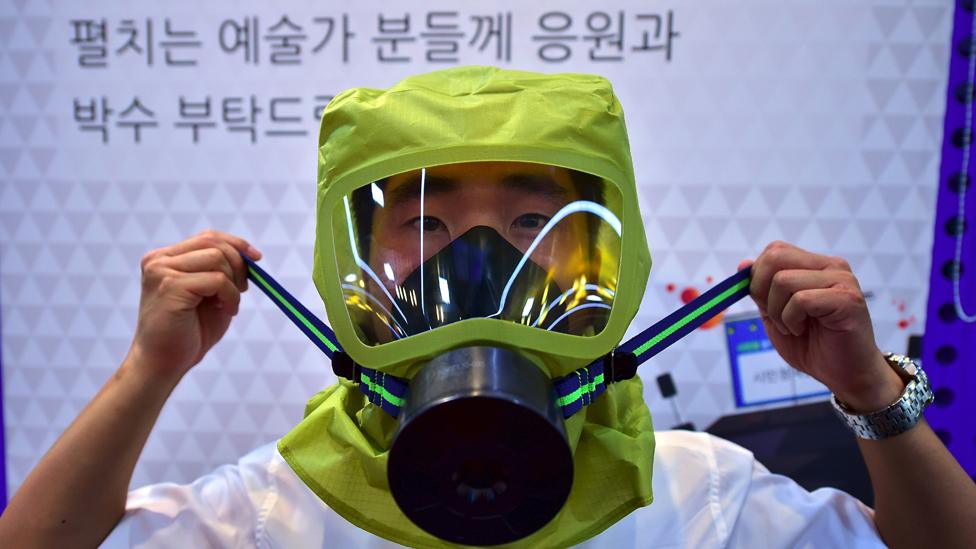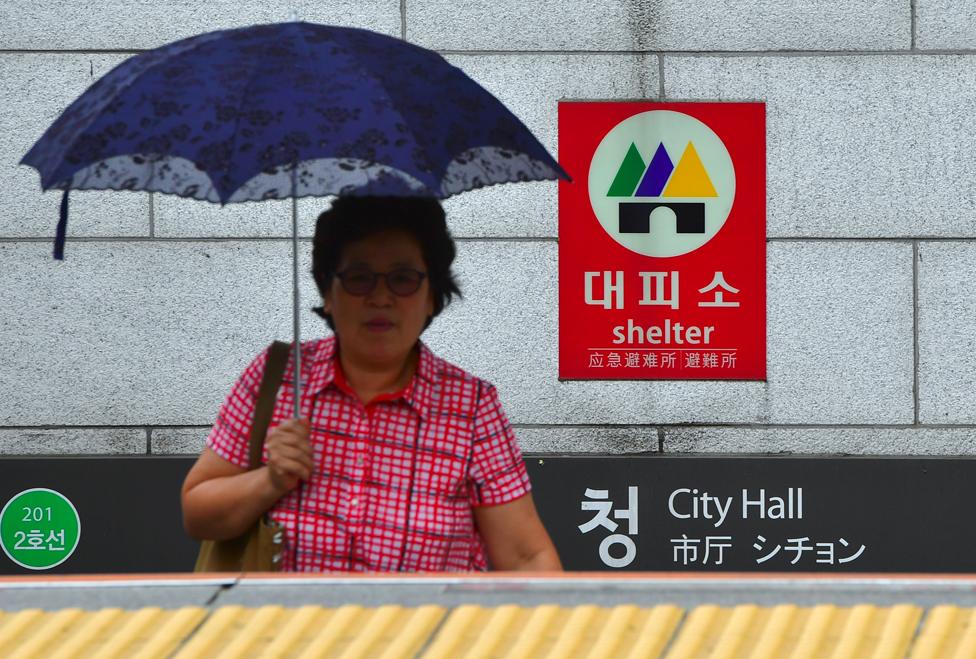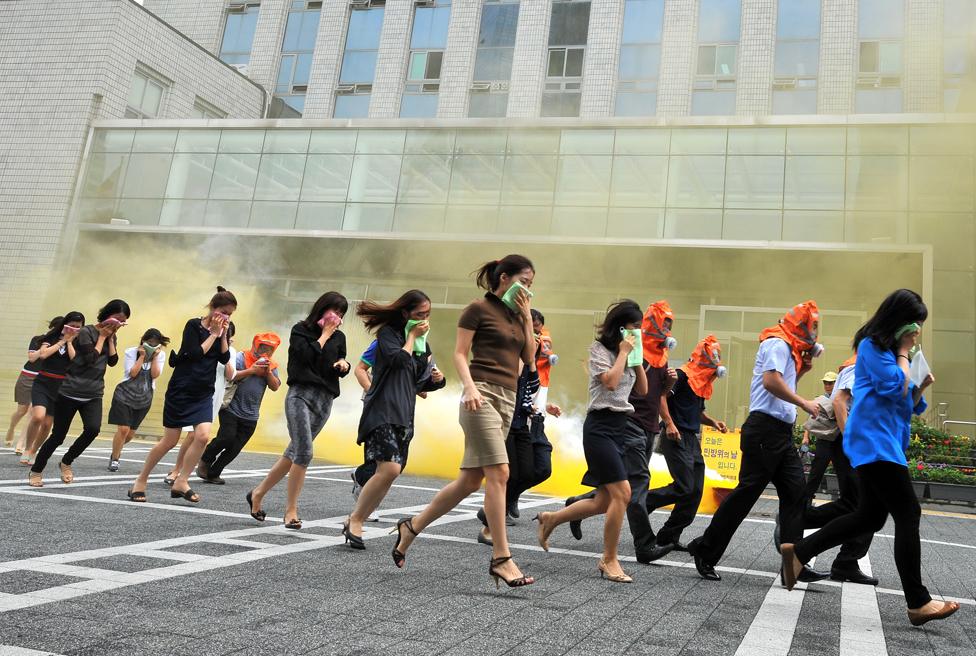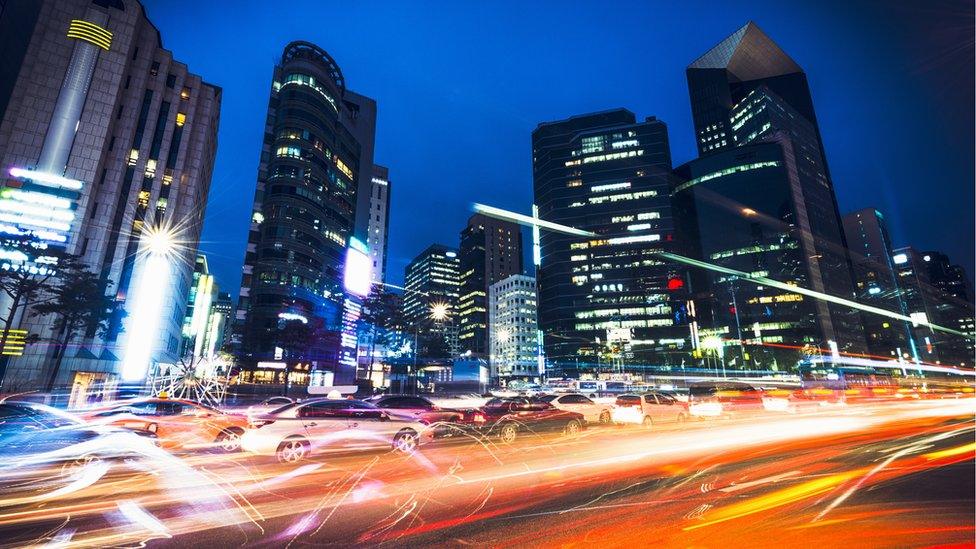Why Seoul isn't fazed by North Korea's threats
- Published

In South Korea's capital, most people aren't too worried by Kim Jong-un's blood-curdling warnings - they're too busy dodging traffic.
There can't be many places where a stranger comes up to you in the rain and gives you an umbrella. Or where a woman alongside you at a crossing leans over to put her umbrella over your bare head.
This kindness of strangers has been bestowed on me twice now. I've been out in the street, caught uncovered in a downpour, and been offered protection by the sheltering brollies of people completely unknown to me. And that is pretty marvellous. It transformed my day. If I may get schmaltzy: whatever the weather, there was sunshine in my heart.

These sunny moments abound in Seoul. I left my camera in a stadium - and returned to find it had been handed in to reception. I have seen people reserve their place at a bar by putting their bulging wallets down and leaving them there while they've gone to the toilet. How long would your wallet last in a restaurant where you live?

Find out more
From Our Own Correspondent has insight and analysis from BBC journalists, correspondents and writers from around the world
Listen on iPlayer, get the podcast or listen on the BBC World Service or on Radio 4 on Thursdays at 11:00 BST and Saturdays at 11:30 BST

This is a city of trust. It is not a city of fear - not even with the massed artillery of North Korea a mere 50 miles (80km) away. We're reminded of that threat every six weeks or so, when there is a civil defence drill. Sirens sound and some people scurry to shelters. Mostly, though, we sit at our desks.
But even with these exercises there's no real sense of fear - even with Kim Jong-un's bloodcurdling threats to turn Seoul into "a sea of fire" or a "heap of ashes" - or sometimes "a sea of flame"- we don't flap.
The last time North Korea exploded a nuclear device was on a Friday morning - yet the Friday night was still a party just like every other Friday night, with salarymen drinking far too much, unperturbed by the efforts of the Supreme Leader not so far away. There was no sign of panic-buying of tinned food, only the normal knocking-back of soju, the firewater that is the Korean national drink.
In the civil defence exercises, one scenario involves a simulated attack on a prominent building by a bunch of gunmen. Smoke bombs are let off and heavily armed police, gas masks on, screech in and deal with the attack.

This 2012 civil defence exercise simulated a gas attack on Seoul
This is not such a fanciful scenario. The flat where I live overlooks the road to the presidential palace. In 1968, just outside my window, a squad of disguised North Korean commandos were caught as they tried to assassinate the South Korean president. There was a firefight - grenades were thrown and the 31 members of Unit 124 of the Korean People's Army made a run for it. Most of were hunted down and killed in Seoul's mountains and forests.
It's true that this was nearly 50 years ago, but that's still in the memory of many people. It's not as though the threat from the North is too remote to be credible. It is just that people don't really believe Kim Jong-un will attack. He must know that retaliation would be swift, and massive - and probably fatal to him.
So we in Seoul remain unruffled, even when the civil defence exercises happen. In fact, they are a peaceful interlude in a busy city. For about 20 minutes, all traffic stops, which I think adds to the sense not of danger, but of safety.

City traffic in Seoul: A more clear and present danger than Kim Jong-un?
It is, you see, respite from South Korea's manic drivers, for whom red lights and pedestrian crossings are invisible. South Korean cars contain televisions, so taxi drivers watch television as they hurtle towards you like barely guided missiles.
There are theories about why the traffic here is so anarchic. One academic posited that it's because this is a refugee society. The civil war which ended in 1953 displaced millions - and, so the theory goes, Koreans still perpetually push forward for fear they will be left behind. It's a theory.
I used to cycle here, but gave it up after playing chicken with a bus - a game which I'm afraid to say the driver won. I gave way, and the humiliation of defeat still hurts.
The bus drivers of Seoul would have made good Japanese kamikaze pilots - they're human Exocets, hurtling towards the stops, with us poor passengers clinging on.
Kim Jong-un's missiles are improving, travelling further with each test. His nuclear bangs get bigger every time. But, logical or not, I still fear the bus drivers of Seoul more than the despot of Pyongyang. I wonder for how long.
Join the conversation - find us on Facebook, external, Instagram, external, Snapchat , externaland Twitter, external.